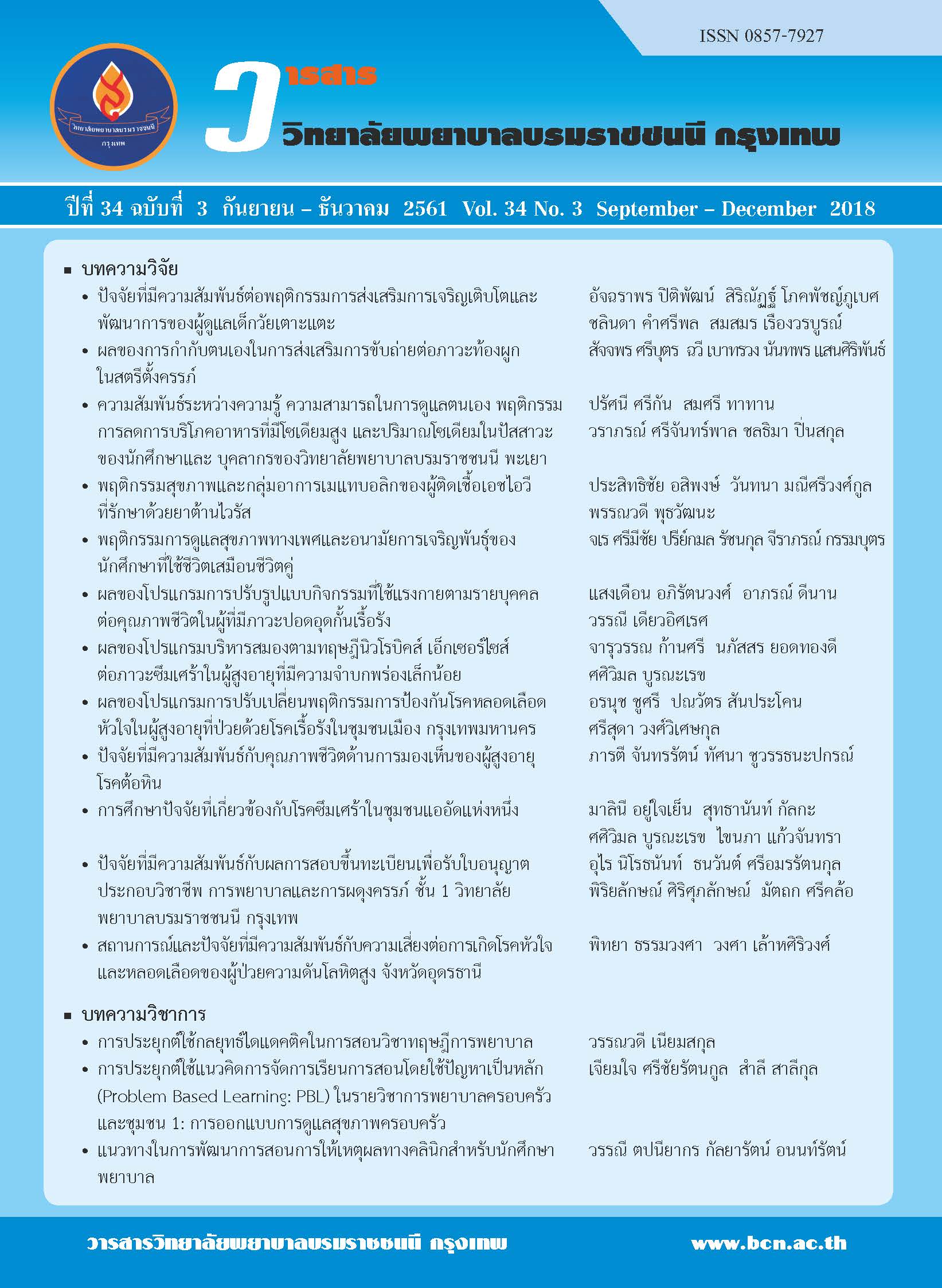การประยุกต์ใช้แนวคิดการจัดการเรียนการสอนโดยใช้ปัญหาเป็นหลัก (Problem Based Learning: PBL) ในรายวิชาการพยาบาลครอบครัวและชุมชน 1: การออกแบบการดูแลสุขภาพครอบครัว
คำสำคัญ:
การสอนโดยใช้ปัญหาเป็นหลัก, การคิดอย่างเป็นระบบ, การทำงานเป็นทีมบทคัดย่อ
การจัดการศึกษาในปัจจุบันมีการเน้นผู้เรียนเป็นสำคัญ ส่งเสริมให้บัณฑิตที่สำเร็จการศึกษาสามารถเรียนรู้ด้วยตนเองอย่างต่อเนื่อง คิดวิเคราะห์เป็น แก้ไขปัญหาโดยเฉพาะในสถานการณ์เฉพาะหน้าได้ มีความคิดริเริ่มสร้างสรรค์ และมีความสามารถในการทำงานเป็นทีมได้ เพื่อให้เป็นบุคคลที่มีคุณภาพสามารถทำงานได้อย่างมีประสิทธิภาพและสามารถทำงานร่วมกับผู้อื่นได้เป็นอย่างดี ผลงานที่ได้จะมีคุณภาพ
บทความนี้ มีวัตถุประสงค์เพื่อนำเสนอการประยุกต์ใช้แนวคิดของการสอนโดยใช้ปัญหาเป็นหลักในการจัดการเรียนการสอนรายวิชาการพยาบาลครอบครัวและชุมชน 1 ในหัวข้อเรื่องกำรออกแบบการดูแลสุขภาพครอบครัว สำหรับนักศึกษาพยาบาลศาสตรบัณฑิต ชั้นปีที่ 2 วิทยาลัยพยาบาลบรมราชชนนี กรุงเทพ ผลการจัดการเรียนการสอน พบว่า นักศึกษาสนุกมีความกระตือรือร้น ได้เรียนรู้วิธีการคิดอย่างเป็นระบบ รู้จักการแลกเปลี่ยนความรู้และวิธีคิดกับเพื่อนๆในกลุ่ม รู้จักการทำงานเป็นทีม นักศึกษาชอบการเรียนแบบนี้มากกว่าการบรรยาย เพราะมีอิสระทางความคิด ได้ฝึกการฟังผู้อื่น และได้ฝึกคิดแก้ปัญหา ซึ่งเป็นทักษะที่สอดคล้องกับทักษะศตวรรษที่ 21
Downloads
เอกสารอ้างอิง
kku.ac.th/chuare/e-article/graduateframework.pdf on. (in Thai).
Aryuwat, S. (2017). Problem based Learning: Challenges for Nursing Education to Develop Learning in 21st Century. Nursing Journal of the Ministry of Public Health, 27(2), 15-30. (in Thai)
Faculties of Praboromarajchanok Institute for Health Workforce Development. (2015). Teacher Guide of
Problem Based Learing for Nursing College under Praboromarjchanok Institute. Nontha Buri:
Yutharin Printing. (in Thai).
Kan, K. (2010). 21st Skills: Why they matter, What they are, and How we get there. In James, B & Ron, B.
(Ed.), 21st Century skills: Rethinking how students learn (xiii-xxxi).
Khamanee, T. (2016). Teaching science: Body of Knowledge for effectively Management in Learning
Process. 20th edition. Bangkok: Chulalongkorn University Printing House. (in Thai).
Klanklin, A. (2012). Problem Based Learning in Nursing. 1st edition. Chiang Mai: Nana Printing House. (in Thai).
Klomim, K. (2017). How to learning Problem Based Learning: Course Design and Development Course for Students Teachers. Graduate Journal of Valaya Alongkorn Rajabhat University under the Royal Patronage, 11(2), 179-192. (in Thai)
Lekakool, A. (2008). Problem Based Learning. Faculty of Medicine. Songkhla Nakarin University. Retrieved
from https://teachingresources.psu.ac.th/document/2548/Le_Kha_Kun/PBL.pdf. (in Thai).
Lawlow, Y. (2014). Introduction to Problem Based Learning. 8th International Interdisciplinary Summer Institute Lecture (Lecture). Canada: School of Nursing, McMaster University.
Makmee, P. (2011). [Internet] Problem Based Learning. EAU Heritage Journal: Social Science andHumaniies, 1(1),
7-14. Retrieved from https://tci-thaijo.org/index.php/EAUHJSocSci/article/view/28708/24713. (in Thai).
Poole L.B., Lunyk-Child O., Lawler Y. (2014). Student and tutor roles in Problem Based Learning. 8th
International Interdisciplinary Summer Institute Lecture (Lecture). Canada: School of Nursing,
McMaster University.
Terry, B. & Sarah, M. (2011). New approaches to Problem-Based Learning: Revitalizing your practice in
higher education. 1st edition. New York: Routledge.
ดาวน์โหลด
เผยแพร่แล้ว
รูปแบบการอ้างอิง
ฉบับ
ประเภทบทความ
สัญญาอนุญาต
บทความที่ได้รับการตีพิมพ์ เป็นลิขสิทธิ์ของวารสารวิจัยสุขภาพและการพยาบาล (วิทยาลัยพยาบาลบรมราชชนนี กรุงเทพ) ไม่สามารถนำไปตีพิมพ์ซ้ำในวารสารฉบับอื่น


















